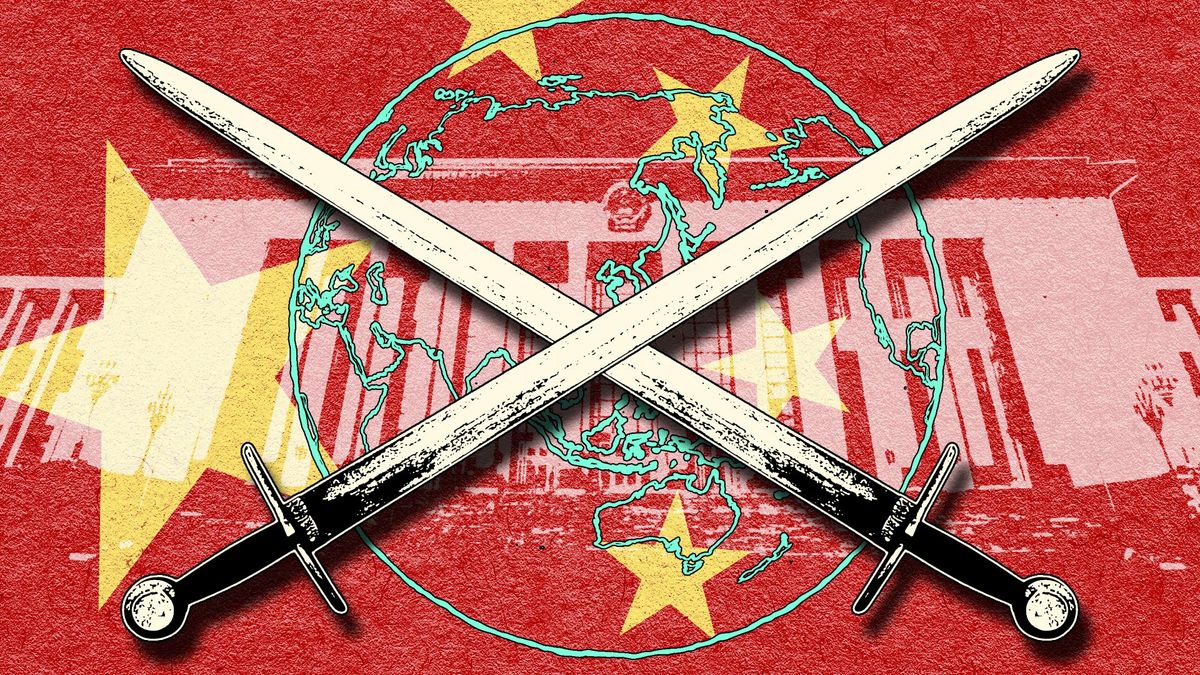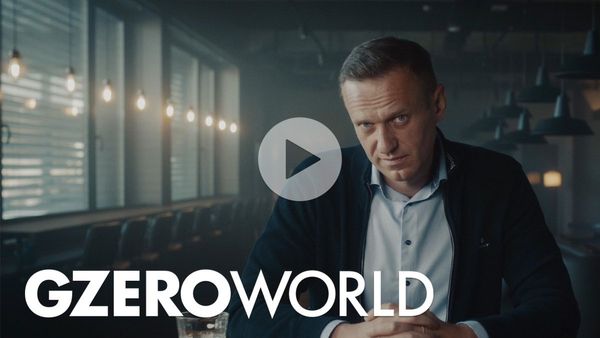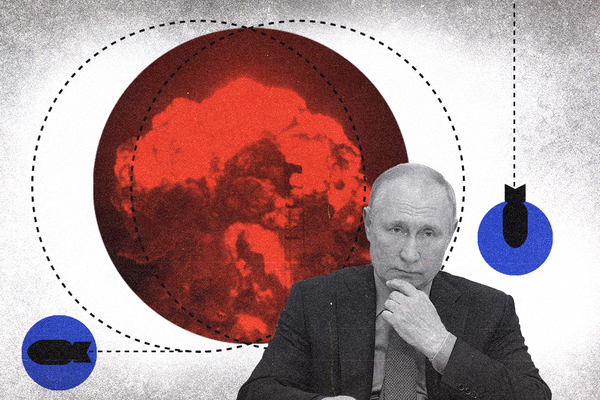O mais importante dessa visita de Xi Jinping a Vladimir Putin nem é tanto a guerra de agressão da Rússia contra a Ucrânia, mas a consolidação desse projeto de "nova ordem mundial", com a sedução do fantasmagórico Sul Global para esse objetivo. Entre os iludidos pode estar o Brasil de Lula 3.
Paulo Roberto de Almeida

When Xi Jinping, on his first trip to Moscow since Russia invaded Ukraine, continues his meetings with Vladimir Putin on Tuesday, expect China's leader to talk a big game on "peace." It won’t be the type of peace that Ukraine — or the West — wants.
Yet, as far as Beijing is concerned, that’s beside the point.
Indeed, geopolitical success is in the eye of the beholder. That was definitely the case in the recent Middle East détente brokered by China, which re-established Iran-Saudi diplomatic ties broken since 2016. For Xi, whether the deal will result in anything meaningful in the long run matters less than clinching the photo-op.
The upshot is to be perceived as the decisive external player that achieved what America could not by getting the Iranians and Saudis to at least be on speaking terms again.
Similarly, this approach also means spinning the optics of its newfound role as a global peacemaker to a huge yet often overlooked audience by the US and its allies: the so-called "Global South" group of countries. Although only a few dozen refused to condemn the invasion at the UN, many more nations have no beef with Russia or Ukraine and have spent over a year waiting for someone to come up with a plan to end a war that they're paying for with economic ruin.
China's recent peace initiatives are thus "in line with aspirations by the silent majority in the rest of the world — countries that are not directly involved in conflicts" in Europe or the Middle East, says Zha Daojiong, a professor at Peking University's School of International Studies.
But that’s only part of a story that’s also about China’s broader role in the world, including its “complicated” relationship with Russia, its existential rivalry with America, and its year-long ghosting of Ukraine.
First, though, why has it taken Beijing so long to start playing global peacemaker? For one thing, until recently it was bad political timing at home.
Xi "was too busy putting out fires domestically at a crucial time for China and himself," says Brian Wong, a geopolitical strategist and co-founder of the Oxford Political Review. With the 20th Communist Party Congress and zero-COVID over, Xi feels he can pay more attention to foreign policy.
For another, China perhaps saw brokering the Iran-Saudi deal as low-hanging fruit that could serve as a dry run for its much more ambitious peace initiative in Ukraine. Wong believes that China seized the moment by leveraging Saudi Crown Prince Mohammed bin Salman's deep hatred of US President Joe Biden along with Beijing’s longstanding ties with Tehran to offer a Middle Eastern olive branch that few saw coming.
The Iran-Saudi deal had clear tangible benefits for China in the form of stable oil prices. What Xi would get from sealing peace in Ukraine is more symbolic but no less important: rehabilitate China's global image tarnished by COVID.
Meanwhile, China’s recent global diplomacy overtures are both strategic and tactical. After all, Xi has long wanted China to have a bigger role in the world. (He once pitched his country as the globalist leader countering an isolationist US under the Trump administration.) But the pandemic put all of that on the back burner.
Now, though, "China has sort of said: Okay, we're done with COVID. We are reengaging with the world. We're sending our leader back out there," explains Neysun Mahboubi, a research scholar at the University of Pennsylvania's Center for the Study of Contemporary China.
In that regard, he adds, China's strategy is not new. Yet, it comes across in a sharper way than it would have in 2019 because the geopolitical landscape has become more polarized — in no small part due to what China watchers refer to as Beijing’s “pro-Russia neutrality.”
At the same time, Mahboubi thinks the recent China-led peace initiatives are also a tactical response to the growing US-China rivalry. Xi, he believes, feels pressured by America to show that "China is a player on the world stage that can act in ways that the US cannot entirely anticipate or control."
And then there's Russia, China's rather unpredictable friend with benefits. The war in Ukraine — which initially caught Xi flat-footed — tested the limits of the bilateral partnership. But a year on, it has brought the two countries closer together by making them more dependent on each other (especially Russia on Chinese imports).
Beijing and Moscow have been forced to team up to push back together against the Western unity that the Russian invasion accomplished. And although the good personal vibes between Xi and Putin certainly help, the main driver is the mutual conviction that the US-led global security alliance is an existential threat to Russia and China.
"The closer America and Europe move towards one another, at least in the eyes of China, the more incentive there is on the part of China to want to absorb Russia into its orbit," says Wong.
Still, by pursuing peace in Ukraine, China might bite off more than it can chew. For Mahboubi, “the degree of difficulty is not even in the same ballpark” as the Iran-Saudi accord.
First, Beijing can hardly claim to be an honest broker — as it could between the Iranian and the Saudis — because it has provided diplomatic cover for Russia at the expense of Ukraine. Second, China's 12-point plan is a nonstarter for NATO since it doesn't call for Russia to withdraw from any occupied territories (which would have been a red line for Putin anyway).
Third, the two sides have little incentive to back down in the short term. Russia and China have high hopes for cracks in Western unity against the Kremlin widening in the coming months. Ukraine, for its part, is gearing up for its much-touted spring counteroffensive.
Still, if China is somehow able to figure that out and offer something that is acceptable to both sides, "that would obviously be incredibly impressive [...] and China would deserve all the plaudits," Mahboubi says. "I just think it's unlikely."
Also, what about dealing with Ukraine, which has been an afterthought for China? This week, Xi has reportedlyscheduled a call with President Volodymyr Zelensky, which would be his first since the war began.
The thing is, Xi knows that Zelensky can't afford not to pick up the phone because only China has enough leverage over Russia to get Putin to back down. Indeed, Zelensky has been careful to avoid publicly criticizing China, has repeatedly asked China to get involved and said that he's open to Chinese support.
"I think Ukraine and Zelensky are more receptive toward China than many of us expect," says Wong. All these public statements are "a clear sign that the Ukrainians [...] genuinely want Chinese assistance because they see China as the only possible mediator."
Finally, Chinese success would box in the US — and possibly create a rift in Europe. If the Europeans suspected America was sabotaging the peace talks by urging Ukraine not to talk to Russia via China, the hand-wringing in Paris and Berlin could have real consequences for NATO unity.
At the end of the day, one unique thing China can offer as a mediator is an uber-pragmatic assessment: Let's not cry over spilled milk.
China "would urge Russia and Ukraine to consider leaving aside the question of who wronged whom for the moment — leave it to the future generations of their peoples — and give priority to stopping the conflict, which is debilitating to both sides," says Zha.
The upshot: Put yourself in China's shoes. No one believes you can broker peace in Ukraine, so no one will be surprised if you can't pull it off. But if you do, you can claim all the credit — and blame others if things go south.
Unlike with arming Russia, there’s no downside to playing peacemaker. Whatever happens, China can't lose. But how it ultimately wins might determine the trajectory and outcome of the war.
Ian Bremmer's Quick Take:
The big story geopolitically is Xi Jinping's trip to Moscow, a three-day state visit, by far the most geopolitically significant summit of the year since the Russian invasion, frankly, a year ago. And also a deeply problematic geopolitical summit, in the sense that it goes strongly against the interests of the United States and all of its allies. Let's keep in mind this summit comes on the back of the International Criminal Court, that is recognized by 123 countries around the world, though not by Russia, the U.S. or China, declaring that Putin is a war criminal and that he should be arrested by any member state if he travels there. Indeed, the German government's already announced, if Putin were to go to Germany, that's it, they're arresting him. Never going to happen. But nonetheless, on the back of that, and then Putin's trip to Crimea and his trip to Mariupol occupied Ukrainian territory over this weekend. Mariupol, first time, he's been in territory the Russians have taken since February 24th.
All of that obviously told to Xi Jinping before the trip was being made. And now, you see these two men, these two authoritarian leaders side-by-side on a global stage. And by far, the friendliest meetup they have had, since February 4th, a year ago when Putin made that trip to Beijing during the Olympics, and they declared that they were friends without global limits. This is very different from what we saw from Putin and Xi Jinping the last time they met in-person back in September. That was in Samarkand. It was the Shanghai Cooperation Organization summit. That was where Putin was on the back foot, he had lost a fair amount of territory from a Ukrainian counteroffensive. His military was underperforming. And indeed, Putin had to publicly recognize that the Chinese had concerns about the Russian War in Ukraine. He's not recognizing that right now.
In fact, what Putin and Xi Jinping are talking about is an opening of negotiations with the Ukrainians, that the Ukrainians are not prepared to accept the potential of a ceasefire on Ukraine, which would allow the Russians to keep the territory they've occupied right now, which the Ukrainians, of course, would not accept.
This is Putin feeling much more comfortable about his geopolitical alignment, at least as far as China is concerned. And that's his most important, most powerful friend on the global stage. Why is that happening right now? Well, number one, it's a bookend to what happened just a couple of weeks ago when Xi Jinping in Beijing was an unprecedented fashion, making comments against the United States, saying that, "Confrontation would come if the U.S. maintained its position of attempting to contain China." We've not seen Xi Jinping call out the Americans directly like that, since he came to office for the first time a decade ago. So he's unhappy with his role vis-a-vis China. That was particularly true when the Americans came out publicly with intelligence that showed that the Chinese were negotiating to provide direct military equipment to Russia, the U.S., the UK and NATO all publicly disclosing that information and warning the Chinese that sanctions would, come direct sanctions if they were to proceed with it.
In other words, exactly the way the Americans treated the Russians with the intelligence they had before the invasion into Ukraine. The Russians denied that invasion. The Chinese denied that they were sending any weapons to Russia. The intelligence seems very hard from what I've heard from a number of actors that have seen it. The point is that the Chinese really didn't like being treated the same way that the Americans were treating the Russians. Of course, in part, that's driving them into a more public relationship with Putin that is warmer and friendlier. At the same time, China also sees, believes that time is increasingly on Russia's side. They don't want their friends, the Russians, to lose this war, but they also see divisions, especially in the United States with Republicans trying to run for the presidency. People like Trump, in particular, but also to a degree, DeSantis and others that are trying to caution against the level of support the Americans are presently providing to Ukraine. And something that the Chinese, of course, would like to see the back of.
So for all of these reasons, this Xi Jinping visit to Russia is a very big deal. I don't believe that the Chinese will actually start providing weapons to the Russians, at least not unless the Russians start performing very, very badly indeed on the ground. So, we'll watch and see how the counteroffensive goes in the coming weeks. I expect the Ukrainians will grab at least some ground, because the issue of the artillery that they've desperately needed, the ammunition appears to have been resolved by the United States and its allies. That should allow the Ukrainians to start a significant counteroffensive in coming weeks. But it also means they need to take a lot of territory back, because otherwise the potential that U.S. support will start to weaken as we get towards 2024, that the US will be more divided and the Europeans will become more divided on the back of that.
That is a big concern, indeed. Now, the big question for the next 24 hours is, will China directly call for a ceasefire and will the Russians support that? I think it is possible. Let's keep in mind that Xi Jinping and Putin are not constrained by checks and balances, by separation of power, by rule of law, which doesn't exist in their country. So if Putin, Xi Jinping individually decide that's what they want to say, they can and they will. The Ukrainians, of course, will have a very hard time with that. They'd have a hard time with calling for negotiations. Let's also keep in mind that while Xi Jinping has a three-day state visit to Russia, they have not yet announced a date for even a phone call, a video call with the Ukrainian President, Zelensky. So while Ukraine is being careful in what he's saying about the Chinese publicly, he absolutely knows that China is playing ball here for the Russians. There is no honest broker, in terms of China's interests in bringing this war to a close.
So Ukraine's in a bit more of a challenging position today, than they were a week ago. Russia certainly feeling stronger than they were a week ago. China feeling on the back of this peace breakthrough that they have resolved with the Saudis and the Iranians, that the Americans were no part of. Now, Xi Jinping is in Moscow, not the message that if you are a NATO country, you want to be seeing coming out of the Kremlin right now.




